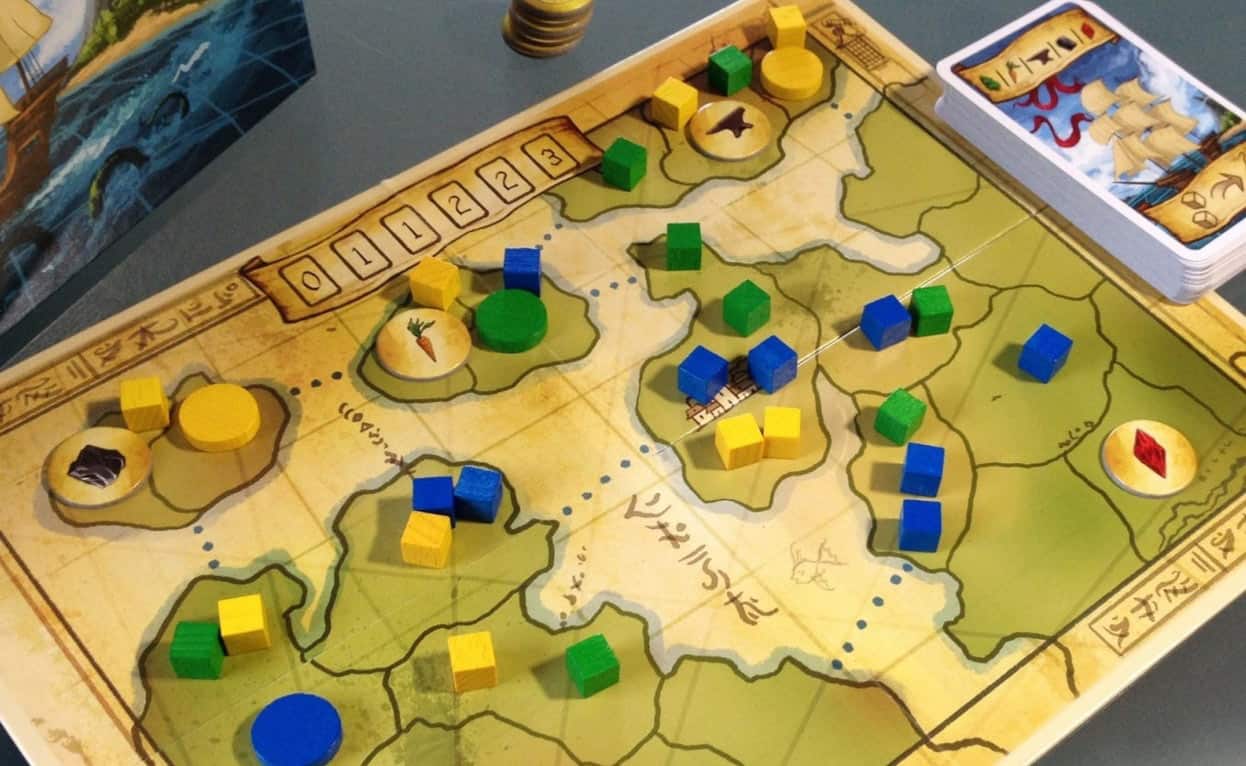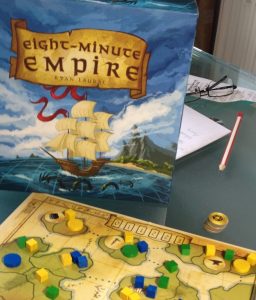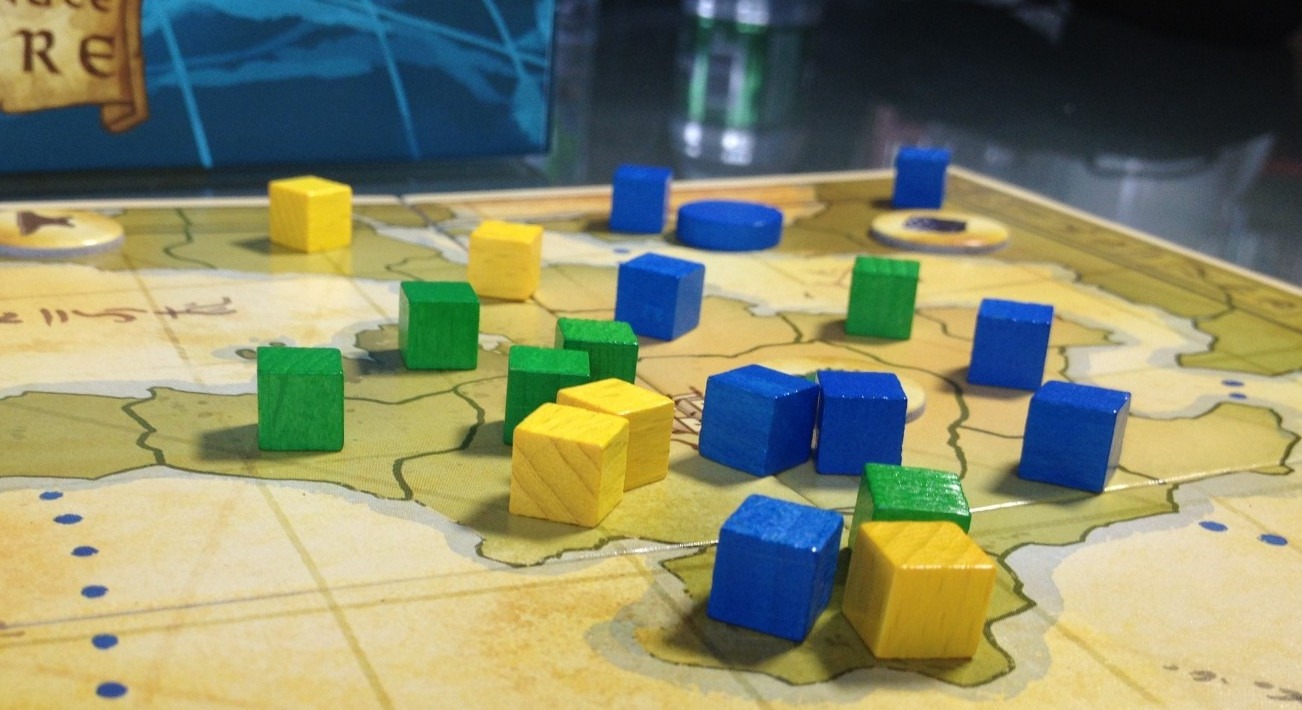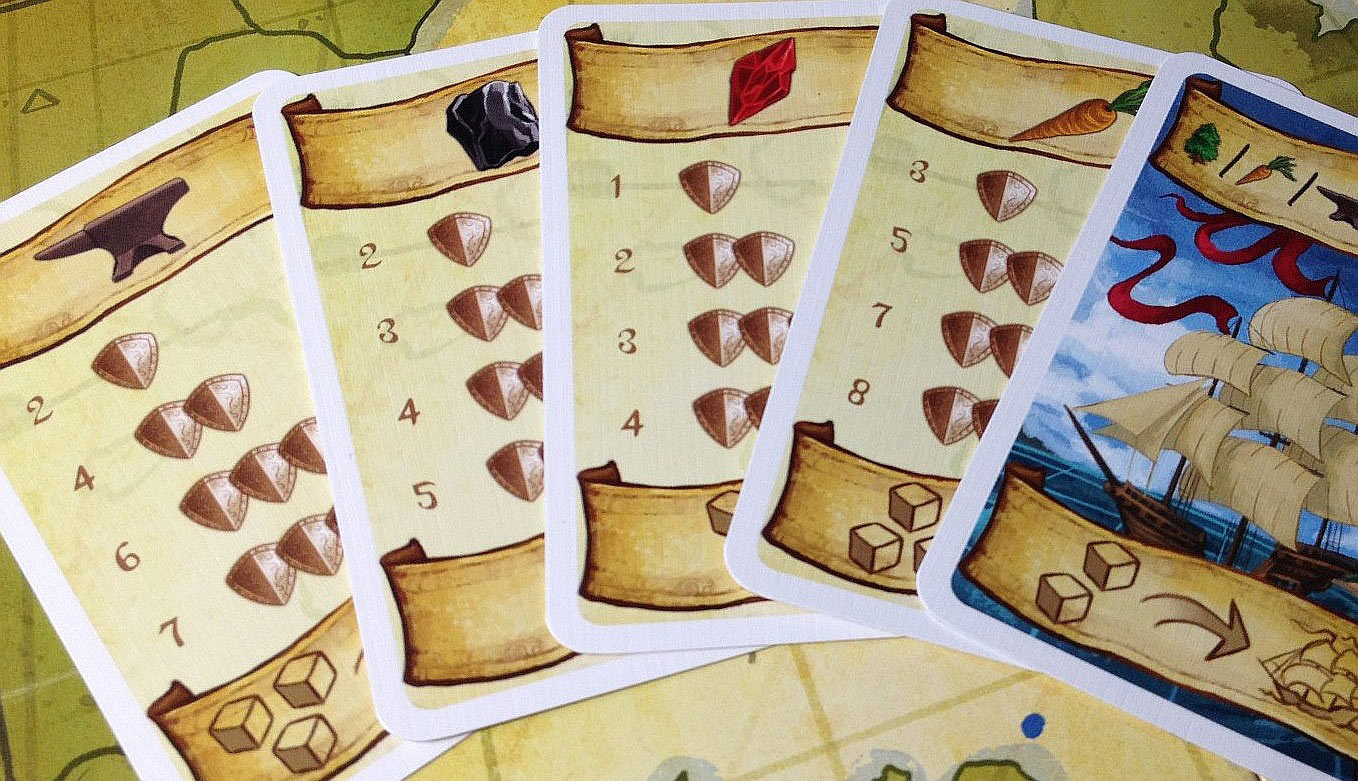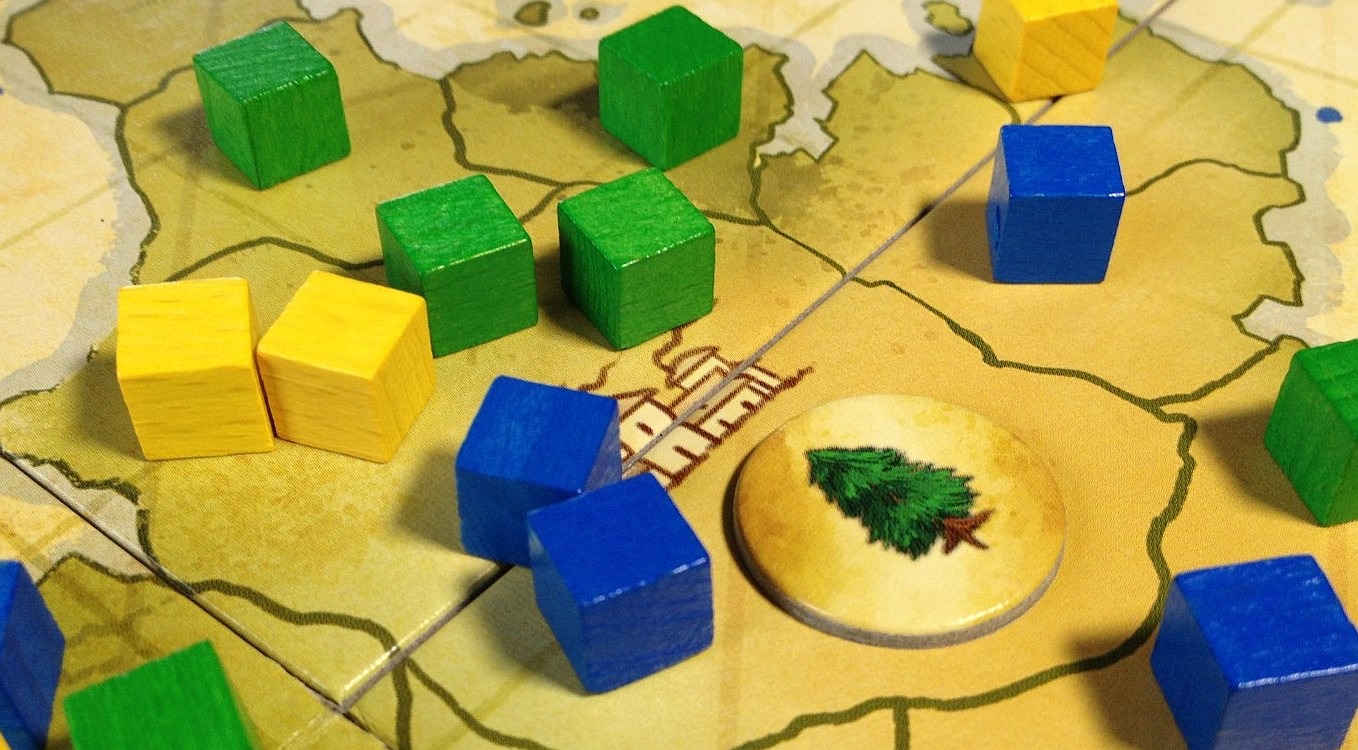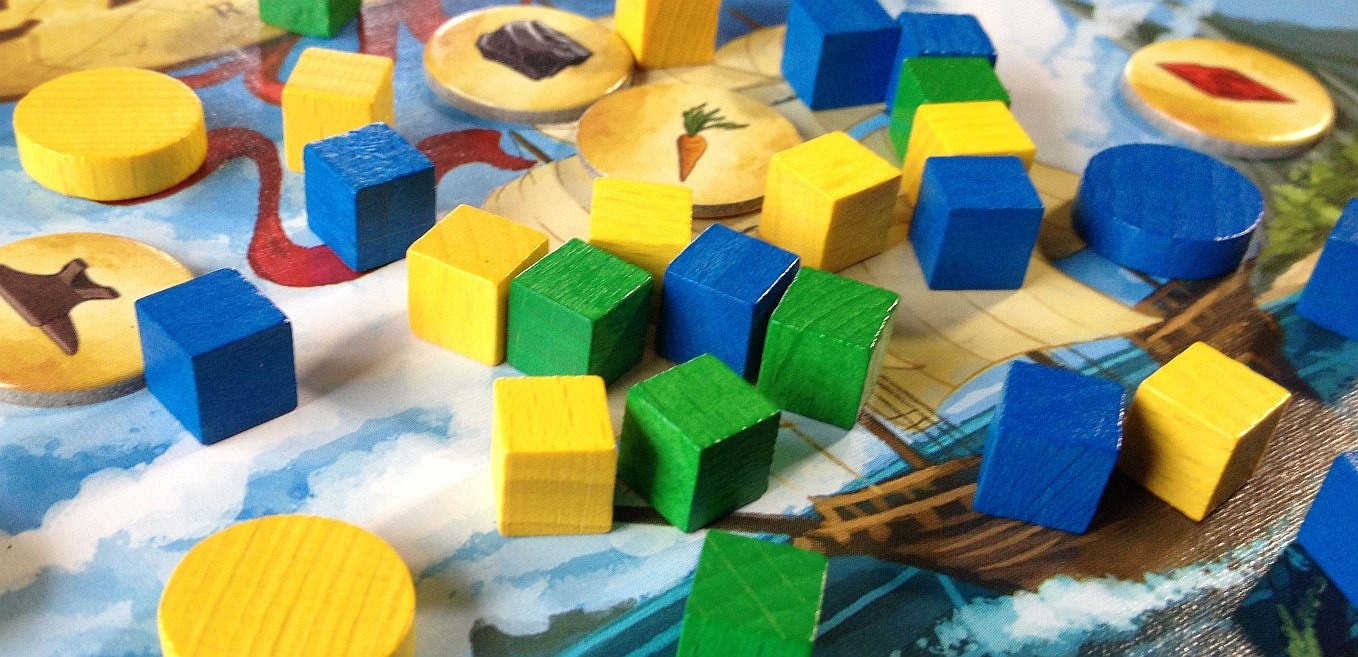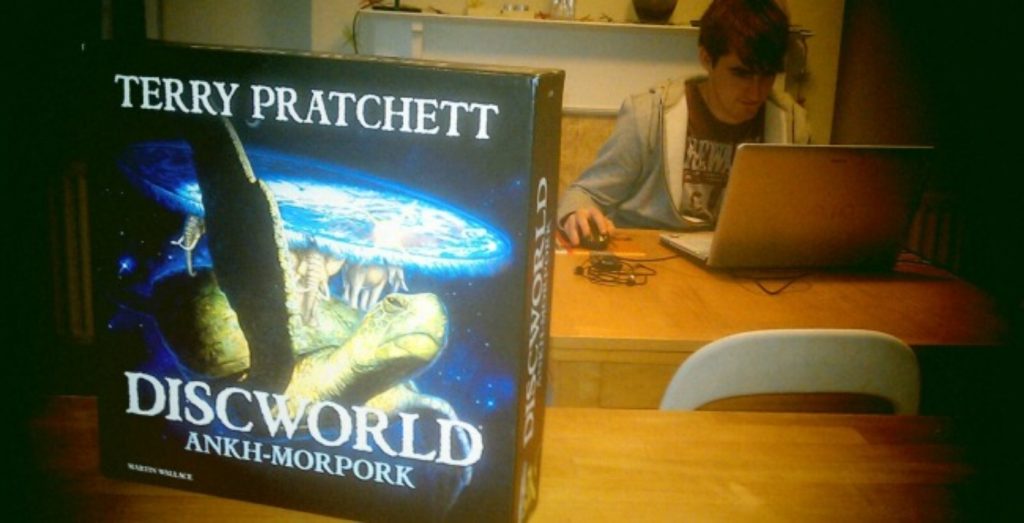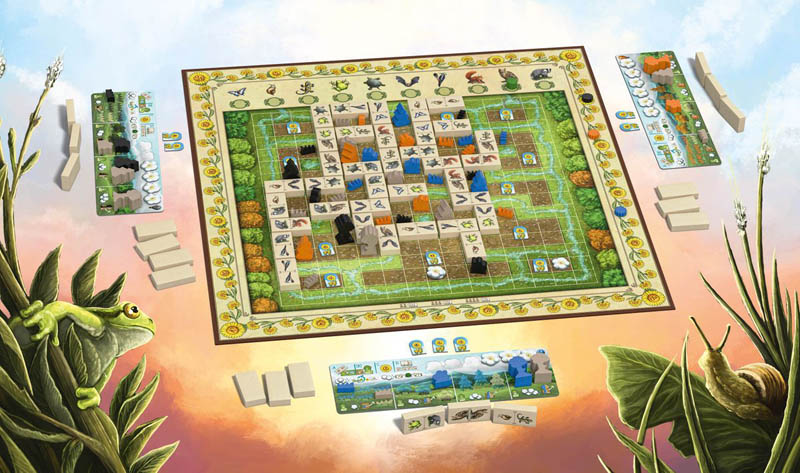Paul: Brendan! That’s a fine flag there. What is that the flag of? An organisation? A cause? An idea? Please don’t tell me it’s the flag of those most arbitrary of constructions, the nation.
Brendan: This is the flag of the Brendovian Empire. You will respect it. You will honour it. You will put it on mugs and t-shirts and probably socks at some point. We have destroyed our enemies. Laid waste to continents. Far is the reach of Brendovia. No persons in the world match the might of our brave men and women. No foreign fiend can meet the ferocity of our will. Our national dish is lemon tart.
Paul: Is that… Is that the Brendovian flag on the news? Is that Panama? Has your empire invaded Panama!? I don’t understand. When did all this happen? When did you found an empire!?
Brendan: About eight minutes ago.
Paul: Oh no. I know exactly what you’ve been playing.
Paul: Eight-Minute Empire will actually take longer than eight minutes. We just thought you should know that first. But it’s okay. It’s okay.
Brendan: It is okay. Because the conflict also starts way within that time frame. It is an ultra-lite game of expansion, city-building and victory points. Each player is in charge of a handful of armies (small wooden cubes) and each must sally forth from the central continent to grab as much land and as many resources (coal, jewels, food) as possible. Well, as much land and resources as can fit onto Eight Minute Empire’s adorable 30cm x 20cm board. Some games make you feel big by giving you a lot of power and control. This game makes you feel big just by unpacking it. And look, there’s even a second map on the underside of the board. Double map!
Also, when we say the game is ‘ultra-lite’ we mean it. The city-building element, for example, involves simply that. Sending out one of your teeny troops to erect a city (represented by a tiny round disc of coloured wood) in the wilderness of a new world. There are no upgrades here. No improvements to be made, no churches to be built, no barracks. Just a little round city, fully-formed. This will allow you to to create armies from that space from that point on.
Paul: So when you plant a city down you are sort of budding off one of your cubelet people, like a pseudopod from a perky little amoeba. A little dollop of your civilisation, plopped down for all to see.
Brendan: Ew.
Paul: But yes, my first thought when I saw the Eight-Minute Empire box was “What on earth is this wee game?” As we started unboxing the cards I had an image in my head of an almost Mundus Novus-like game of trading and of consolidating power. But Eight-Minute Empire is actually just about immediately trying to expand and to conquer everything, everywhere, as soon as possible. Immediately.
There’s no compromise, there’s no reason to wait. From your very first turn, where you start with just three cubes on the centre of the map, the only thing you’ll be doing is making more cubes and then spreading those cubes across the land, forming an ever-widening and sort of lumpy imperial paste. Coating the land like a sort of expansionist hummus.
Brendan: Again, ew. How could you describe anything in this game being like mushy chickpeas?
Paul: My brain certainly was after I tried to work out exactly how I was going to grab and keep everything. Nothing is very secure. Nothing is guaranteed.
Brendan: I assure you, it is not. Anyway, we should probably explain how the game actually works. To start, six cards are laid out in a line above the map of the world. Players get a small stipend of gold and then bid to see who goes first. Generally, you don’t want to bid super high. Those gold pieces? They don’t come back. You can’t earn more as the game goes on, so budgeting has to be a part of your strategy. “Remember to budget, or you’re likely to fudge it.” That’s what we say in the Brendovian Empire.
Players then choose which of the six cards they want to grab. Each card will have a resource on it — wood, jewels, metal and so on — but also an action. This is the important part. The action will dictate what you are going to do with your micro-military. You might nab the card that lets you spread five of your elite cubes through the countryside, or you might go for the card that lets you cross the ocean in a single bound, opening up a whole new continent to conquer. Or, if you’re concerned about getting Your Lads some backup, you’ll take the card that lets you reinforce one or more of your cities with new cubes. The point is: every card is geared towards getting out and getting some more of that delicious earth.
Paul: It’s rare that a card comes up that gives you the chance to set down one of your little round cities, though, so it can be a while before you get another place to spawn your little square people. It’s also rare that you get the chance to remove someone else’s little square people. Cards like that do come up, but they’re as rare as a crab in a cake shop and they only return the piece to your opponent anyway. They’re only a temporary reprieve against their invasive ambitions.
Brendan: Not to mention that most of these cards cost money, Paul. Depending on where they are in the running, they cost anything between 0 and 3 pieces of gold. And when you take a card, the rest shift to the left and a new card is replenished, meaning some things become cheaper and something completely new comes in. Which brings in an element of paranoid market competition. It makes you think: ‘Oh no, I really need that new city-building card. Do I splash 3 coins on it just in case Paul grabs it? Or do I wait until it travels down the track, becoming cheaper?’ All this brings back the importance of budgeting! A budget is incredibly important. BUDGETING.
Paul: You really love budgeting, don’t you?
Brendan: The Brendovian Empire wasn’t built on irresponsible spending. The fiercest weapon is the spreadsheet.
Paul: Right. So, the lack of chances to kill anyone else or put down a new home means you’ve always got to concentrate on your own expansions. All the time. Constantly. Always nudging one more cube into a contested territory, or always pushing a little further to claim more virgin land. So, what do you think?
Brendan: You know, I think I like it a lot. I have a huge fear of area control games because some have a tendency to include so many moving parts, so many different angles and so many different methods of gaining VPs, that my brain just shuts off. After a while I stop keeping track. Eight Minute Empire is light enough that it never gets to that point. But it is also so streamlined that it still feels compelling. If I were to make one suggestion to buyers, it would be that playing the ‘Goods Tokens’ variant is essential. This places bonus resources down in important locations on the map, leading to a race between players for the choicest stuff. The game would only be half as good without it.
Paul: Yeah, I like it too. It’s like a smaller version of El Grande, a game all about just filling up a place more than anyone fills up a place. It’s smaller, but it’s arguably more cutthroat. It’s an entirely unambiguous grab for land and resources that makes it very obvious where you’re winning and losing, resulting in a sort of eternal, imperial jostling, where you’re all trying to get space at an ever-thinning colonial buffet, grabbing for every dish you can while you can. Stuffing yourself while screwing everyone else. A bit like —
Brendan: Caligula.
Paul: What? I… how did you —
Brendan: How did I know you were going to say Caligula? Because I know you, Paul. We have had people watching you for some time now. You always mention Caligula in your reviews. It’s come up quite a few times. We fear you might have some… power fantasies.
Paul: No! It’s becau —
Brendan: Code six. Brendovian Praetor to Re-education Squad 3. We have a code six.
Paul: NO DON’T.
Brendan: It’s okay Paul. These people will take care of you. Just relax.
Paul: NO. Death to the Brendovian Empire! I won’t go quietly! Long live the Deatianic mff mfff mppfff mmmmpffhh.
Brendan: All stand for the Brendovian National Anthem.
Paul: Mmpfff mpfff mfff mmmmfpfm.

